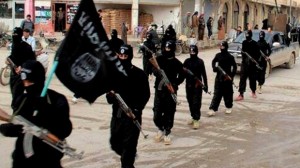Regional boots on the ground to fight ISIS
 No one wants to put troops in harm’s way. To some extent, this cautiousness is to be commended.
No one wants to put troops in harm’s way. To some extent, this cautiousness is to be commended.
After Paris, the talk in Western capitals is increasingly warlike. Everyone seems to agree that the only way forward is military intervention in Syria and the consequent defeat and destruction of the Islamic State (ISIS). But how is this to be done when the only other point of consensus is the following doleful realism: It should not be accomplished by Western ground forces.
This appears to be a red line for the United States and it is not just about US President Barack Obama’s long-held views on war as “an expression of human folly” and his reluctance to commit American troops to a blood-soaked engagement that lasts long into the future.
It would not be strategically smart to get involved too closely, as US Secretary of State John Kerry reiterated to the Overseas Security Advisory Council in Washington. “Most people don’t think that another invasion by Americans in yet another Muslim country in which the local citizens are not prepared to fight back and hold the land that you then gain makes a lot of sense,” he said.
The French, wounded to the quick and eager to avenge the November 13th attacks, want a “grand and single coalition” as French President François Hollande puts it. But even this pro-active search for a solution has only resulted in a relatively distant approach so far. It has taken the form of fierce air strikes by French planes bolstered by US intelligence and cheered by the prospect of cooperation between Russian warships and the French military.
Even the British, slowly but surely being led by Prime Minister David Cameron to try to get parliamentary support for intervention in Syria, are really only contemplating a limited role in air strikes against ISIS targets.
No one wants to put troops in harm’s way. To some extent, this cautiousness is to be commended. It indicates that the Western powers have learnt some lessons from past mistakes and are recalibrating their counterterrorism policies accordingly.
But it also means that someone — or something — else has to get in on the ground to take Raqqa and Mosul. The first is the so-called capital of the extremist group’s pretentious claims to a caliphate. The second, Iraq’s second largest city, is home to pipelines that carry oil into Turkey.
Mosul, said Michael Knights, an expert on Iraqi security at the Washington Institute for Near East Policy, has long been used by ISIS as a “fundraising centre”. Its takeover in June 2014 was an enormous breakthrough in terms of ISIS’s demonstrable capability and self-confidence. A major metropolis the size of Philadelphia, control of Mosul signifies more than the sum of its parts.
The only way to really damage ISIS then is to loosen its hold on the territory it claims. This has to start with Raqqa and Mosul. But which army can do it?
So far, American plans to train Iraqi forces to fight ISIS in their country and Kurds and others to take it on in Syria have yielded little. It is incrementalist, which by definition, means grindingly slow. The attacks on Paris and the high level of perceived threat in other Western capitals mean there is no longer the luxury of time.
This brings us to the inevitable question: which boots could legitimately and reliably be on the ground against ISIS?
It stands to reason that any force that tackles ISIS needs to be Muslim. Egypt and Turkey are the only regional forces with the required indigenous and religious credentials — and military capability — to tackle ISIS. But would either or both be ready and willing?
Egypt, which is already fighting ISIS-affiliates in the Sinai, has its own absorbing problems. Even offers of enhanced US military assistance may not be much of an inducement, considering that it is already well supported by Washington.
So far, Turkey seems to be the only country which may be willing to consider a ground operation against ISIS as Turkish Prime Minister Ahmet Davutoglu indicated in a November 10th interview with CNN. But he also said Turkey would only do so within a coalition with a well defined strategy.
The best incentive for Turkey would probably be something that money and Western military assistance could not buy — respect for a regional force with pretensions to indispensable status. If there is anything that Turkey really wants — as President Recep Tayyip Erdogan indicated last month just before the German chancellor’s visit to Ankara — it is European fraternalisation. At the time, the Turkish president called on the West to act as it spoke: “The West and Europe’s security and stability is contingent on our security and stability. They have accepted this now… It can’t happen without Turkey. So if it can’t happen without Turkey, why don’t you take Turkey into the EU?” he challenged. This is not about line-by-line adherence to European regulations but the European Union’s historical unwillingness to accept a huge Muslim country into the club.
The chances are that Turkey’s reservations about fighting ISIS would be overcome if it were within sight of a larger strategic objective, such as a fast-tracked EU membership application. The Americans have spoken in favour of this for years. Until now, Europe has paid little heed. Paris may concentrate minds on what needs to be done.

